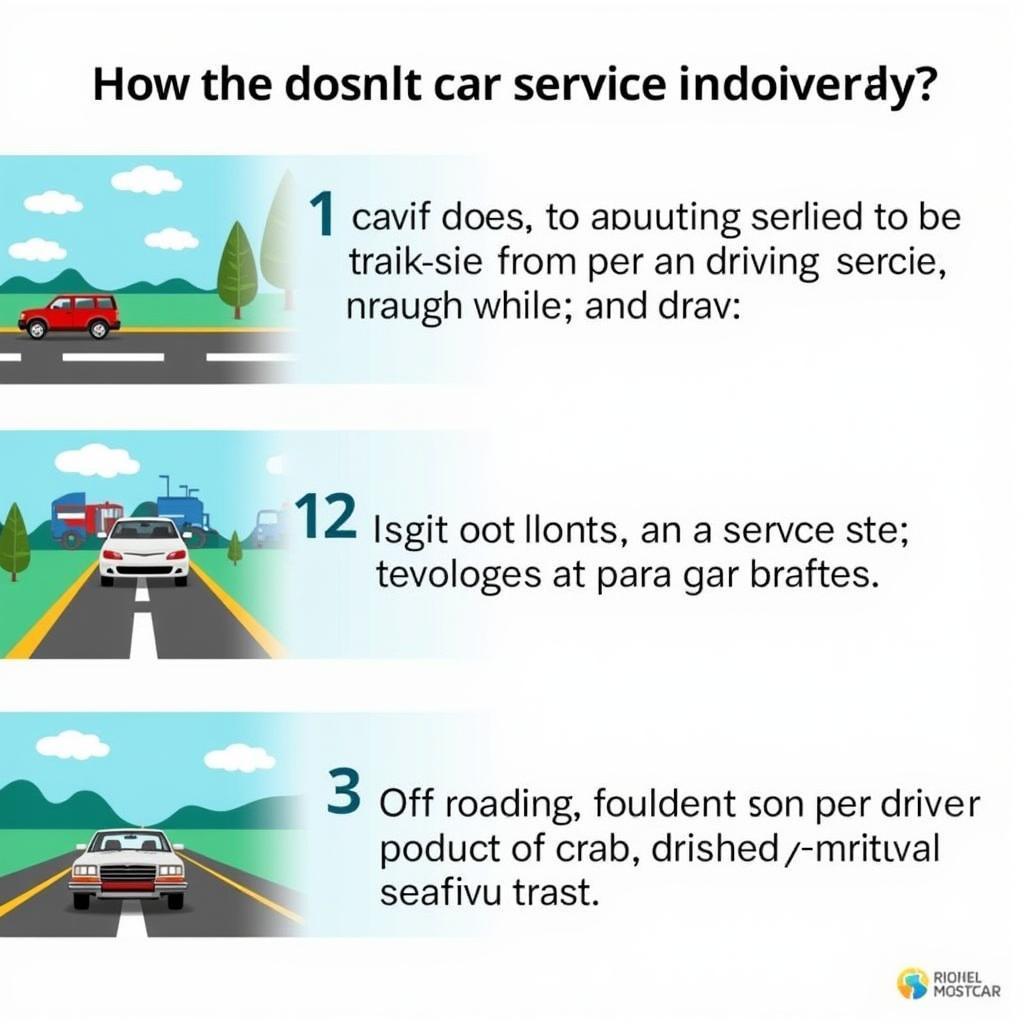Maintaining your car is crucial for its longevity, performance, and safety. Knowing how often should a car get serviced can save you money in the long run and prevent unexpected breakdowns. There’s no one-size-fits-all answer, but understanding the factors involved can help you determine the best service schedule for your vehicle.
Getting your car serviced regularly is essential. But how often should a car get serviced, exactly? This depends on various factors, including the make and model of your car, your driving habits, and the type of driving you do. Following your car manufacturer’s recommended service schedule is always the best starting point. This schedule is outlined in your owner’s manual and provides specific service intervals based on mileage or time, whichever comes first. Sticking to this schedule ensures all necessary maintenance tasks are performed at the correct intervals. You can find more specific guidance at how often should you get your car serviced subaru.
Understanding Your Car’s Service Needs
Understanding your vehicle’s specific requirements is vital. Different cars have different maintenance needs, and factors such as age, mileage, and driving conditions play a significant role. For example, vehicles driven in harsh conditions, like extreme temperatures or off-road terrain, may require more frequent servicing than those driven primarily on paved roads.
- Regular Oil Changes: Oil changes are the most frequent maintenance task, typically recommended every 3,000 to 7,500 miles depending on the oil type and your car’s specifications. Regular oil changes are vital for lubricating the engine and preventing premature wear.
- Tire Rotations: Tire rotations are typically recommended every 5,000 to 7,500 miles to ensure even wear and extend tire life.
- Brake Inspections: Brake inspections should be performed annually or as needed if you notice any signs of brake problems.
Factors Affecting Service Intervals
Beyond the standard recommendations, several factors can influence how often you should get your car serviced.
Driving Conditions
Do you primarily drive in city traffic, on highways, or off-road? City driving, with frequent stops and starts, can put more strain on your vehicle than highway driving. Similarly, off-road driving exposes your car to harsher conditions, requiring more frequent maintenance. Learn more about servicing frequency at how often should car get serviced.
Climate
Extreme temperatures, both hot and cold, can impact your car’s performance and require specific maintenance adjustments. For instance, in colder climates, you may need to change your oil more frequently.
Driving Habits
Aggressive driving, such as rapid acceleration and hard braking, can put extra stress on your car’s components and necessitate more frequent servicing.
Modern Car Servicing and Technology
Modern cars are equipped with sophisticated technology and advanced diagnostic systems. This allows technicians to identify potential problems more efficiently and accurately. Regular servicing combined with diagnostic checks can prevent minor issues from escalating into major repairs. Check out how often should you get your car services for more insights.
What does a car service include?
A typical car service includes checking and replacing fluids (oil, coolant, brake fluid), inspecting brakes and tires, and checking the battery, filters, and belts. More comprehensive services might also include checking the suspension, steering, and exhaust system. For specific information on air conditioning service, you can visit how often should you get your car air conditioner serviced.
The Importance of Preventative Maintenance
Preventative maintenance is crucial for keeping your car running smoothly and avoiding costly repairs down the road. Regular servicing can identify potential problems early, saving you money and preventing unexpected breakdowns.
“Regular car servicing isn’t just about fixing what’s broken. It’s about preventing problems before they even start,” says automotive expert, James Miller. “A well-maintained car is a safe and reliable car.”
Conclusion
How often should a car get serviced? While manufacturer recommendations are the best starting point, considering your individual driving habits, conditions, and climate can help you determine the optimal service schedule for your vehicle. Regular maintenance and preventative servicing are key to extending the life of your car, enhancing its performance, and ensuring your safety on the road. Don’t neglect your car’s needs – a little preventative maintenance goes a long way. For those in the UK, specific guidance can be found at how often should i get my car serviced uk.
FAQ
-
What is a basic car service? A basic car service typically includes an oil change, filter replacement, and a general inspection of key components.
-
How often should I rotate my tires? Generally, tire rotation is recommended every 5,000 to 7,500 miles.
-
What are signs I need a brake service? Squealing or grinding noises, a spongy brake pedal, or vibrations when braking are all potential signs of brake problems.
-
Why is regular car servicing important? Regular servicing helps prevent major repairs, enhances safety, improves fuel efficiency, and maintains the resale value of your vehicle.
-
What is the difference between a major and minor service? A minor service focuses on routine maintenance like oil changes and filter replacements, while a major service is more comprehensive and includes checks on more complex systems.
-
How can I find a reliable car service center? Ask for recommendations from friends and family, check online reviews, and look for certifications and accreditations.
-
How much does a car service typically cost? The cost varies depending on the type of service, your car’s make and model, and the location of the service center.
“Staying on top of your car’s maintenance needs is an investment, not an expense,” advises automotive consultant, Sarah Johnson. “It saves you money in the long run and keeps you safe on the road.”
If you need further assistance, please don’t hesitate to contact us via WhatsApp: +1(641)206-8880, or Email: [email protected]. Our customer service team is available 24/7.



